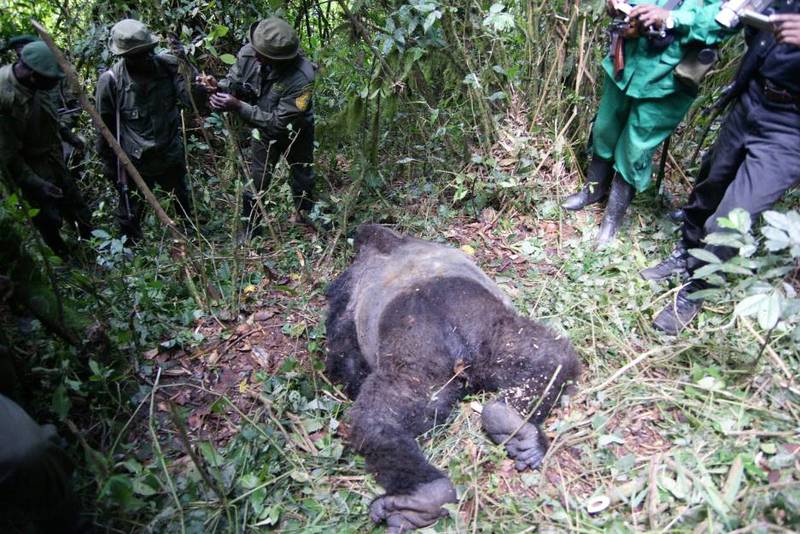Mufanzala
Categories: Journal no. 38, Gorilla Groups, Democratic Republic of the Congo, Kahuzi-Biega, Grauer's Gorilla, Gorilla Journal
On March 26th, 2009, the rangers and trackers of the Kahuzi-Biega National Park (KBNP) made the tragic discovery of the corpse of the silverback Mufanzala, a 30-year-old male gorilla and leader of a family of 18 individuals. The discovery was made during a daily patrol as part of the regular monitoring of this family. Mufanzala had never shown any sign of disease until the evening before his death, when the trackers say they heard unusual vocalisations from the gorilla. The following day, the male was found dead, with his face against the ground. There were no signs of violence or aggression having been perpetrated upon the body.
The following day, the responsible authorities of KBNP, among them Site Head Radar Nishuli, went to where the corpse had been discovered in order to confirm the death officially. This was an emotional moment for the park staff. Mufanzala was one of the sons of the silverback Mubalala who lived in the KBNP prior to the 1996-1998 war. Towards the end of 1998, Mubalala was killed by armed bands fighting in that region. Although then still a blackback, Mufanzala took over the leadership of the group from his father in 1999. Currently the group consists of 18 gorillas and was monitored regularly, although it was still not completely used to the presence of humans.
The death of Mufanzala is a great loss for the park. He now rests in peace on Buzimba hill in the middle of the park, in the forest where he was born and where he matured into the leader of a large family. Park staff will intensify their contacts with the family to determine if one of Mufanzala's sons will take over the leadership from his dead father, as Mufanzala himself did when his own father Mubalala died.
In order to verify the cause of death, the responsible authorities at the park decided to draw on the expertise of the vets of the partner organisations Coopera and the Mountain Gorilla Veterinary Project (MGVP) to conduct an autopsy. In such a case, all possibilities of disease and/or a potential epidemic must be ruled out - so as to protect the rest of the gorilla population in the KBNP. The autopsy found that Mufanzala died of a liver abscess, related to his advanced age. It was a natural death: a great relief to the park staff. The KBNP authorities sincerely thank Coopera and the MGVP for their readiness to collaborate, and for the high level of professionalism shown during their work in the park.
As the last refuge of the subspecies Gorilla beringei graueri, the KBNP bears a heavy responsibility for the protection and the conservation of these primates. In addition, as a World Heritage Site, the KBNP also has the responsibility of ensuring that the biodiversity of this exceptional part of sub-Saharan Africa is conserved.
The KBNP is one of the World Heritage Sites most at risk. It faces many threats from the most recent conflicts in Kivu, such as the presence of armed groups, illegal mining activities, charcoal burning and poaching. In their endeavours to get the KBNP off the list of sites in danger, the park authorities are doubling their efforts to increase monitoring levels, to improve the quality of monitoring and research, to work more closely with the populations living close to the park in community conservation approaches, and to increase the understanding of the economic importance of the KBNP in the reconstruction of the South Kivu province. The latter is achieved with the help of improved communication concerning the environment, the development of eco-tourism and through general lobbying at provincial, national and international levels.
The new leadership team of the KBNP, which has been in place since August 2008, is working hard to overcome this enormous challenge in collaboration with partner organizations (WWF, WCS, MGVP, Coopera, the Born Free Foundation, the Frankfurt Zoological Society, GTZ, Berggorilla & Regenwald Direkthilfe and many others that cannot be mentioned here due to lack of space).
Thanks to all our supporters for helping us to ensure that the descendants of the silverback Mufanzala will continue to prosper in freedom and safety in the Kahuzi-Biega National Park World Heritage Site, the pride of the Democratic Republic of the Congo.
Radar Birhashirwa Nishuli


